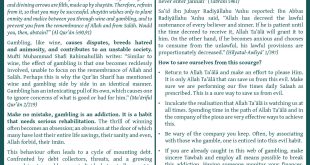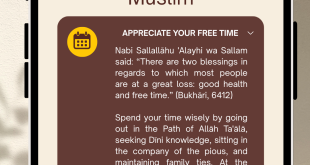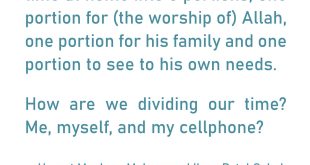
The Beautiful Qualities of Hazrat Zainab bint Jahsh (radhiyallahu ‘anha)
It is a well-known fact that the actions and behavior of a person reflect what he possesses in his heart. If one’s heart is brimming with the love of Allah and His Rasul (sallallahu ‘alaihi wasallam), then this love will express itself by him obeying Allah Ta‘ala, leading a life in conformity to the sunnah and treating the creation with love and kindness. On the contrary, if one’s heart is brimming with love for wealth or love for name and fame, then this love will express itself in his endeavors, conduct and behavior.
When we examine the lives of the respected wives of Rasulullah (sallallahu ‘alaihi wasallam), we find that every aspect of their lives radiated the true love of Allah and His Rasul (sallallahu ‘alaihi wasallam). It was on account of their purity and goodness that Allah Ta‘ala divinely selected them to be the wives of Rasulullah (sallallahu ‘alaihi wasallam) in this world and the Hereafter.
Often, when people sit together, the discussion revolves around other people’s lives, and gossip or gheebah (backbiting) occurs. However, the respected wives of Rasulullah (sallallahu ‘alaihi wasallam) were extremely cautious in refraining from these types of sins.
One of the wives of Rasulullah (sallallahu ‘alaihi wasallam) was Hazrat Zainab bint Jahsh (radhiyallahu ‘anha). She possessed many outstanding qualities, among which was her clean-heartedness and her extreme caution in refraining from gheebah or gossip.
Refraining from Gheebah
During the scandal against Hazrat Aaisah (radhiyallahu ‘anha), there were many hypocrites who were actively involved in spreading false rumors and accusations against her. Allah Ta‘ala revealed two rukoos of the Qur’aan declaring her innocence and purity. Prior to these verses being revealed, Rasulullah (sallallahu ‘alaihi wasallam) asked Hazrat Zainab (radhiyallahu ‘anha) regarding her co-wife, Hazrat Aaishah (radhiyallahu ‘anha). She spontaneously responded, “I protect my ears and eyes from giving false information regarding that which I did not hear or see. I only know good regarding Hazrat Aaishah (radhiyallahu ‘anha)!” (Saheeh Bukhaari #2661)
Her Kindness towards the Poor
Apart from Hazrat Zainab’s (radhiyallahu ‘anha) clean-heartedness and purity, she was very kind and compassionate towards the poor. She would tan animal hides, sell them, and thereafter spend the income on the poor and needy. (Mirqaat vol. 4, pg. 1325)
Rasulullah (sallallahu ‘alaihi wasallam) once said to his respected wives, “The first of you to join me after my demise will be the wife with the longest arms.” The respected wives initially thought that the literal meaning of this statement was intended. Thus, they began to measure the length of their arms and found that the one among them with the longest arms was Hazrat Saudah (radhiyallahu ‘anha). However, only when Hazrat Zainab (radhiyallahu ‘anha) passed away first did they realize that the literal meaning of ‘longest arms’ was not intended. Rather, the figurative meaning was intended, referring to the one who gave the most sadaqah. (Saheeh Bukhaari #1420)
Her High Level of Purdah
During the farewell haj, Rasulullah (sallallahu alaihi wasallam) addressed his respected wives and said to them, “After this, remain in your homes (i.e. after performing haj, remain in your homes and do not leave your homes without a valid need).” Hazrat Abu Hurairah (radhiyallahu anhu) mentions that it was on account of this statement of Rasulullah (sallallahu alaihi wasallam) that Hazrat Zainab and Hazrat Saudah (radhiyallahu ‘anhuma) never left their homes thereafter to even perform nafl haj. Hazrat Zainab and Hazrat Saudah (radhiyallahu anhuma) would say, “By Allah! We never mounted a conveyance after hearing this from Rasulullah (sallallahu alaihi wasallam).” (Musnad Ahmed #26751)
From this, we understand that Hazrat Zainab (radhiyallahu ‘anha) was extremely conscious of purdah and despite it being permissible for her to travel for nafl haj and umrah, she preferred to remain within her home until the end of her live.
 Wifāq ul Ulāma (SA) ASSOCIATION OF SOUTH AFRICAN 'ULAMA
Wifāq ul Ulāma (SA) ASSOCIATION OF SOUTH AFRICAN 'ULAMA


